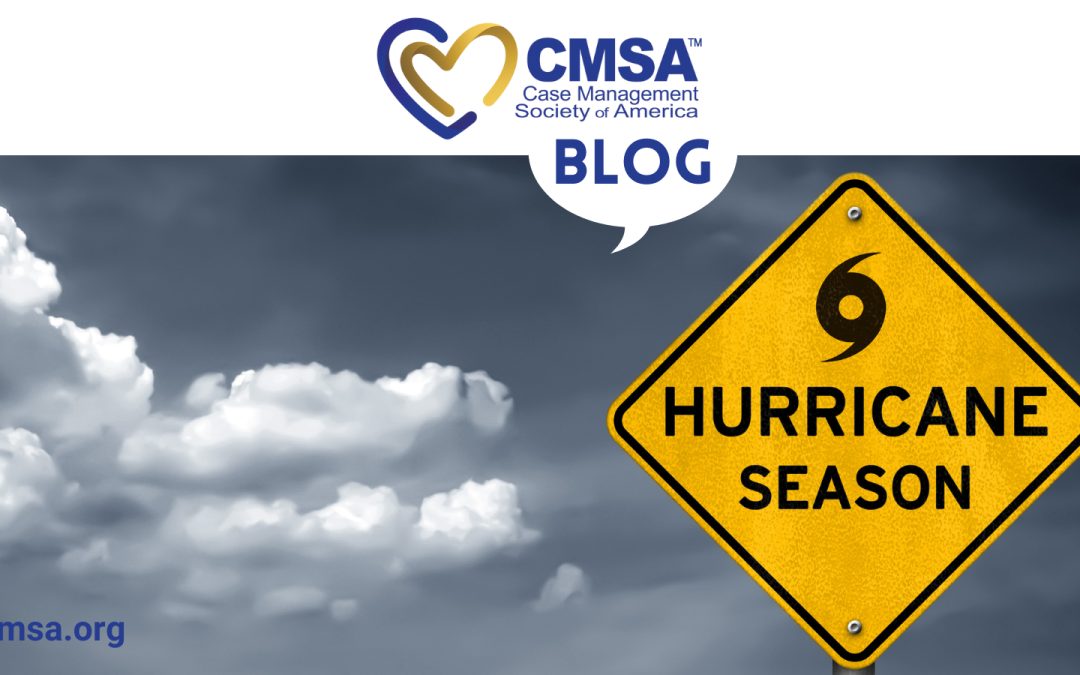As I look forward to the summer season of outdoor recreation, vacations, backyard barbeques, festivals, concerts, and of course, the Case Management Society of America’s Annual Conference, I am reminded of the joys of June, July and August in the USA. Summer is a vibrant, active time of the year and many people take advantage of climates that make it easier to engage in healthy lifestyles activities. Conversely, as a native Louisianan, summer also signals the start of hurricane season. May is the month where our family solidifies safety and evacuation plans for the “Louisiana Crew.” In other words, which families will migrate to whose home north, west or east of the Louisiana hurricane zone? The plan ensures everyone has accurate address/contact information, alternate routes, extra food and shelter provisions and a contingency plan for healthcare. This planning activity inspired a few “thoughts to ponder.”
What happens when survivors of natural disasters are forced to relocate, with no notice, to different parts of the country? How do they access healthcare in the aftermath of massive loss of personal belongings and severe economic distress? Do natural disasters lead to human migration and resettlement in areas that are ill-prepared for an influx of people? Is the healthcare system nimble enough to absorb large numbers of people in a compressed time frame? Are there enough hospitals, clinics, medical staff, etc. to accommodate new patients? How is continuity of care affected and what impact does it have on people with chronic conditions? An abbreviated review of the literature revealed studies and articles on natural disaster migration, socioeconomic impact of climate migration and the implications for healthcare from the perspective of health equity. No matter one’s beliefs about the existence of climate change, natural disasters are real and manifest in droughts, wildfires and extreme weather events such as tornadoes, floods and hurricanes. If families are forced to migrate during the aftermath of a natural disaster, any health disparity already in existence will compound the risks and complications for access to care in the new location.
Raker, et al. (2020) conducted a 15-year prospective study on the survivors of Hurricane Katrina that devastated New Orleans, Louisiana and surrounding areas in 2005. The study recommended five priorities to address the health consequences of natural disasters in the immediate aftermath and long term (Raker, et al., 2020). The study’s five priorities are:
- Primary Prevention of Disaster Exposure
- Improve Post Disaster Healthcare
- Social Services Integration
- Aid Survivors in Social Support and Community Building
- Targeted, Long-Term Services for Highly Affected Survivors (Raker et al., 2020)
This article is but one example of many that examine the effects of natural disasters on survivors’ healthcare needs and the ability to access services. A common theme implicitly or explicitly noted was the need for care coordination, healthcare management and case management. One explicit quote referencing case management from Raker, et al., (2020) recognized that “care coordination interventions and physical colocation of services to create ‘medical homes’ have proved effective in post-disaster settings.” An implicit reference to integrated case management was the Raker et al., (2020) conclusion that stepped-care models expanded the reach and availability of psychological treatments in addition to physical care, resulting in posttraumatic growth and stability in the aftermath of natural disasters. Further considerations are warranted in the role of case management in times of disaster response. I plan to include some of these recommendations on my checklist as my Louisiana family solidifies plans for hurricane season. As case managers, what can we do to improve the lives of survivors of natural disasters? The opportunities are there. Let’s do this!
Reference: Raker, E. J., Arcaya, M. C., Lowe, S. R., Zacher, M., Rhodes, J., & Waters, M. C. (2020). Mitigating health disparities after natural disasters: Lessons from the RISK project. Health Affairs, 39(12), 2128-2135. http://dx.doi.org/10.1377/hlthaff.2020.01161
It's not hurricane season yet! To hear more thought-provoking topics like this, join us in Orlando, June 1-4 at the CMSA Annual Conference! Register TODAY: https://cmsa.societyconference.com/v2/


I had experiences with weather events growing up on LI & while living in NJ. Important reminders, Melanie!